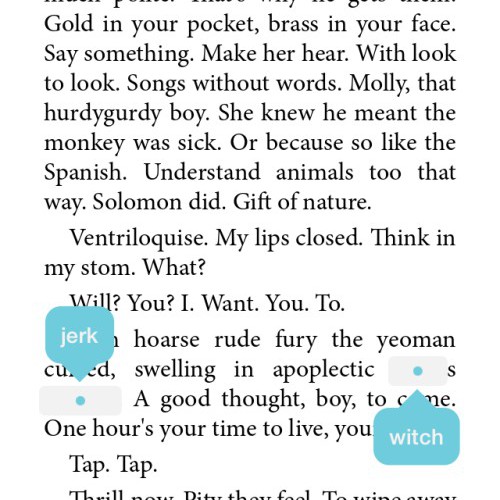Clean Reader‘s tagline is, “Read books, not profanity.” Created by Jared and Kirsten Maughan after their daughter came home sad about the language in a book she was reading, the app obscures offensive words in ebooks with a small blue dot. In Clean Reader, “offensive” words range anywhere from “swear words” to “clinical terms for genitalia,” depending on which of the three cleansing levels the reader chooses. Tapping on the blue dot reveals a milder approximation of the word in question, allowing the reader to get the gist, if not the specifics, of the term. A strange idea, perhaps, but nothing new. Clean Reader is basically a do-it-yourself bowdlerization app, allowing sensitive readers to join in on the fun while still shielding themselves from disagreeable material. In the past, these readers largely had to content themselves with avoiding the distasteful books in question (or maybe picking up that one edition of Huckleberry Finn with the n-word removed. Now, they can (almost) fully experience any literary phenomenon they desire.
Almost, that is, because the app is still working out some flaws. Its understanding of offensive words manages to be both overzealous and strangely incomplete. As an app, it lacks the ability to parse context, and its mechanical replacement of one word with another renders some passages unintelligible while ascribing entirely new meaning to others. One of the more infamous quirks of the app is its developers’ decision to replace all synonyms for female genetalia with the word “bottom,” lending sex scenes in particular a whole new flavor that the target demographic will likely find objectionable.
On their website, the Maughams have responded to allegations that the app may violate copyright law, writing, “Clean Reader does not violate copyright law because it doesn’t make changes to the file containing the book. All Clean Reader does is change the way the content is displayed on the screen.” But in changing that displayed content, the app also changes the nature of the book. Profanity has a place in literature. Authors use it by design, choosing their words carefully to create a certain effect—an effect that may fall a little flat once its impact has been neutered by a string of “darns,” “gees,” and “freaking hecks.” Usually, choosing to read a book means agreeing to accept the world the author has provided, as it is and intact. Clean Reader allows its users to ignore that agreement, picking apart the text with no concern for authorial intent. And to what end? Clean Reader cannot obscure context. Even with the explicit words removed, a sex scene in a book will still read as a scene about sex, and many books with offensive language will continue to offend, whether one is reading the profanity off the page or figuring it out from contextual clues. So who are these readers who are okay with reading about vice as long as the swears are cut out? Who exactly is Clean Reader for?
Clean Reader seems to be in the process of figuring that out for itself. Inktera, which provided ebooks for the in-app bookstore until recently, has decided to pull its collection, leaving the app largely unusable in its current form. We will have to wait and see what comes of Clean Reader 2.0, but for now, maybe the best we can hope for is the opportunity for more discussion—about authorial intent, about the use of profanity in literature and in language, and about the value of profanity (or, some would argue, lack thereof). These are all worthwhile conversations to have, and having them will probably be more productive than simply ignoring the issue. But if, after all that, you still find that swear words are making you sad, maybe it’s just time to choose a different book.

